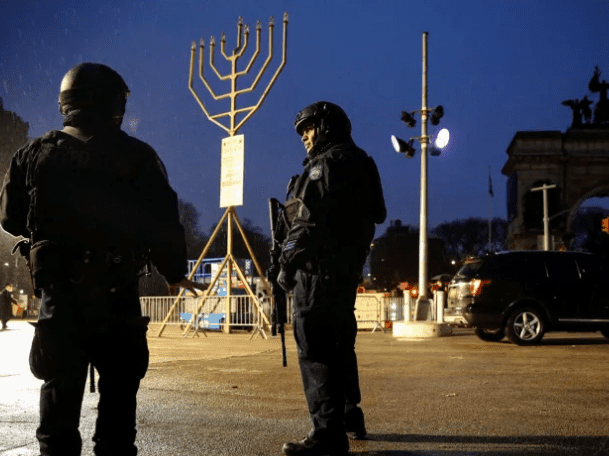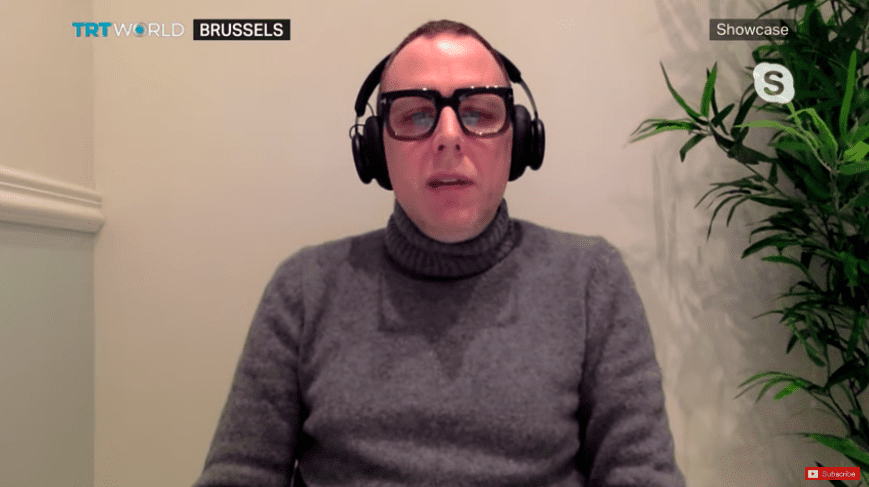Many are fearful of saying the wrong thing, with Netanyahu and Bennett’s tone-deaf approaches to previous Diaspora attacks seemingly serving as warnings
As news of the horrific knife attack in Monsey was breaking on Saturday – the police still in pursuit of the perpetrator, the injured victims being rushed to hospitals – the CNN anchor turned to the network’s correspondent in Jerusalem for reaction.
It’s hard to imagine how, in any other circumstances, a violent crime in the heart of the United States would cause a network to turn to a foreign nation for comment. But the spate of anti-Semitic attacks on American Jews over the past few months, culminating in this month’s Jersey City and Monsey attacks, sent them to what they assumed would be a logical address for the most immediate reaction to Jewish persecution: the Jewish state.
In reality, though, Israeli leaders are now often hesitant to be among the first to speak out against anti-Semitic violence in the Diaspora. It isn’t because they aren’t deeply concerned by the phenomenon, which is being covered thoroughly in Israel, but because the odds of saying the wrong thing are high.
The degree of difficulty in devising the appropriate response has also risen in an era where anti-Semitism has become a political weapon. Israel’s leaders are justifiably fearful that the slightest slip of the tongue will be transformed into ammunition in the left-right political wars overseas, and then fired against the Jewish state itself.
That caution was evident in the defensive tone of the very first official response to the attack, provided by President Reuven Rivlin. “Anti-Semitism is not just a Jewish problem, and certainly not just the State of Israel’s problem,” Rivlin stated. “We must work together to confront this rising evil, which is a real global threat.”
Rivlin’s words set the tone for other Israeli officials. They walked a tightrope between Israel’s commitment to defending Jews around the world, refusing to stand by passively as they suffer and die at the hands of attackers, while avoiding the appearance of treading on the internal political and security matters of another country.
It took until Sunday for Prime Minister Benjamin Netanyahu to issue his carefully worded reaction at the start of the weekly cabinet meeting. “Israel strongly condemns the recent displays of anti-Semitism, including the vicious attack at the home of a rabbi in Monsey, NY, during Hanukkah,” he said. He also expressed willingness to “cooperate however possible with the local authorities in order to assist in defeating this phenomenon. We offer our assistance to every country.”
Public Security Minister Gilad Erdan, meanwhile, vowed to “work tirelessly to restore the sense of personal security each and every Jew deserves,” lacing his statement with a pro-Israel advocacy message, saying that “the delegitimization and anti-Semitism we face every day has raised its ugly head once again.”
Israel’s ambassador to the United Nations, Danny Danon, pushed a bit harder, calling for unspecified “action” against violent anti-Semitism, declaring that “This is a time for action, not words. … This is a time for enforcement that deters the perpetrators of hate, whoever they may be.”
Only one Israeli official – Yisrael Beiteinu leader Avigdor Lieberman – offered up the traditional Zionist response to anti-Semitic violence in the Diaspora: Suggesting Jews could only be truly safe in their own state. “Again and again, we are witnessing the dire consequences of anti-Semitism,” he wrote. “Alongside the deep grief and best wishes for the injured, it is important to know that the main solution to such phenomena is immigration to Israel.”
Maybe it is because Lieberman is not currently serving as a government minister, or perhaps because he made his call for embattled Diaspora Jews to move to Israel in Hebrew, that the blowback was minimal.
In contrast, when Netanyahu sent the same message in 2015, following the murderous attack on a kosher grocery store in Paris, France’s Jewish community was infuriated.
Two days after the attack took place on January 9, Netanyahu responded by forming a special ministerial committee to discuss steps to encourage aliyah from France (and Europe in general), stating: “I wish to tell all French and European Jews – Israel is your home.” He reiterated that message when he visited a synagogue full of Parisian Jews shortly afterward, pointing out that “Jews these days have an opportunity that did not exist in the past: to live freely in the only Jewish state, the State of Israel.” He added that “any Jew who chooses to come to Israel will be greeted with open arms and an open heart. It is not a foreign nation, and hopefully they and you will one day come to Israel.”
There was a fierce negative reaction from France’s chief rabbi, Haïm Korsia, and other representatives of French and European Jewry. Rabbi Menachem Margolin, general director of the European Jewish Association, said Netanyahu and others “must cease this Pavlovian reaction every time Jews in Europe are attacked.”
He complained that “after every anti-Semitic attack in Europe, the Israeli government issues the same statements about the importance of aliyah, rather than employ every diplomatic and informational means at its disposal to strengthen the safety of Jewish life in Europe.” Margolin added that “every such Israeli campaign severely weakens and damages the Jewish communities that have the right to live securely wherever they are.”
France’s then-prime minister, Manuel Valls, also rejected Netanyahu’s call, stating that if 100,000 Jews left the country, “France will no longer be France. The French Republic will be judged a failure.”
Whether because Israel’s government leadership learned a lesson from the 2015 experience, or due to its general caution around American Jews, there has not been a hint of a call for American Jews to consider emigration to Israel – even after the most shocking recent anti-Semitic attacks in Pittsburgh and Poway in October 2018 and last April, respectively.
After those incidents, the official Israeli response ran into a different kind of trouble: the perception of political partisanship. Israeli officials were criticized for taking sides in the bitter round of finger-pointing that followed the Pittsburgh synagogue massacre, after supporting President Donald Trump and defending him against those who felt he had fanned the flames of white supremacism.
Then-Diaspora Affairs Minister Naftali Bennett, who visited the United States following the Pittsburgh shooting, insisted in an interview that “using the horrible anti-Semitic massacre to attack the president is unfair, it’s wrong,” adding that Trump was “a great friend of Israel and of the Jews.” And at a public event, Bennett indicated that the reaction to the massacre was overblown, saying: “This is not in any sense Germany of the ’30s, it doesn’t resemble that in any possible way.”
Bennett was slammed for stepping out of line – for lecturing, instead of listening to the pain of American Jews trying to cope with the threat of anti-Semitism. The minefield of U.S. identity politics has only grown more treacherous since, with an intensification of what pundit Benjamin Wittes calls “selective outrage” around anti-Semitism.
Increasingly, those on the right and left are pointing fingers at each other depending on who the perpetrator of an anti-Semitic attack may be, refusing to acknowledge that hatred of Jews “does not align with any simple political narrative,” Wittes wrote in The Atlantic on Sunday.
And so it is little wonder that Israeli leaders – particularly while they are consumed with their own country’s domestic political turmoil – are choosing the path of issuing carefully worded statements about Monsey and other attacks, and then, for the most part, staying out of the fray. They have much to potentially lose, and little if anything to gain.
As The Forward’s opinion editor Batya Ungar-Sargon pointed out Sunday in an op-ed titled “Why no one can talk about the attacks against Orthodox Jews,” “At a time when ideology seems to [reign] supreme in the chattering and political classes, the return of pogroms to Jewish life on American soil transcends ideology. In the fight against anti-Semitism, you don’t get to easily blame your traditional enemies – which, in the age of Trump, is a nonstarter for most people.”
Including, it seems, Israel’s political leaders.
The article was published on Haaretz














